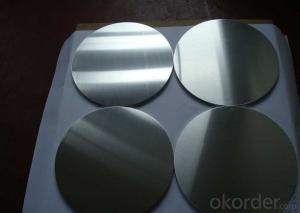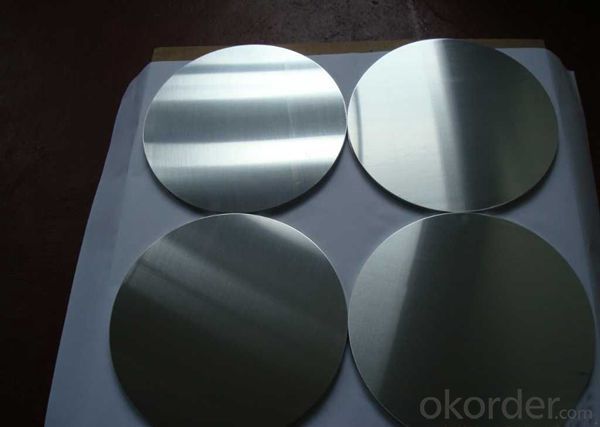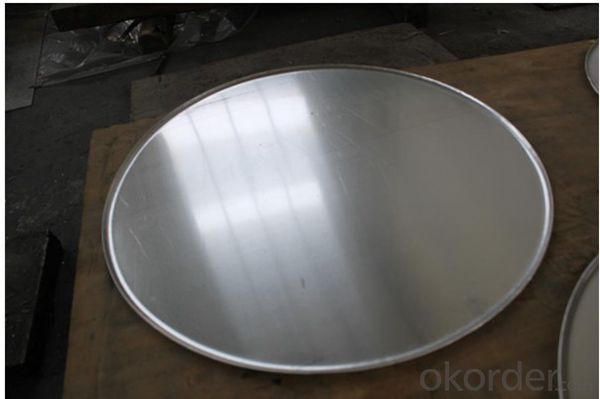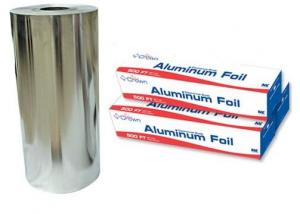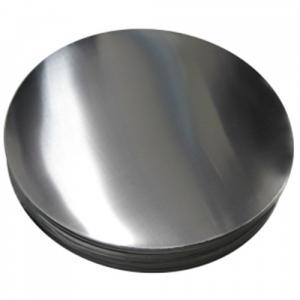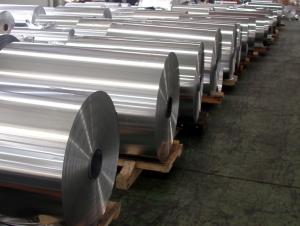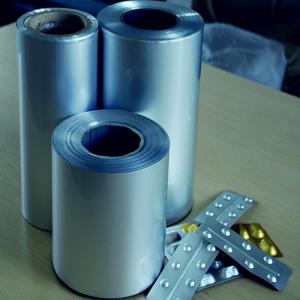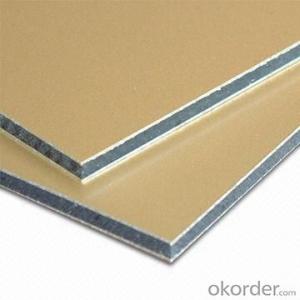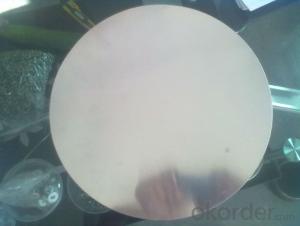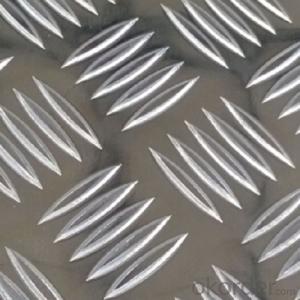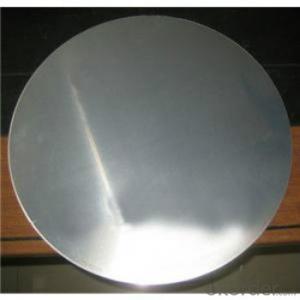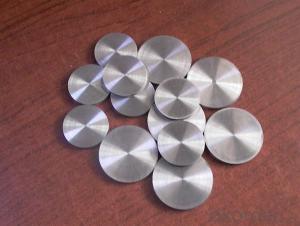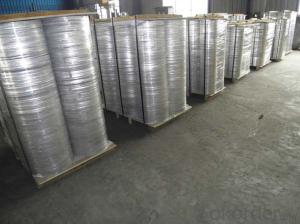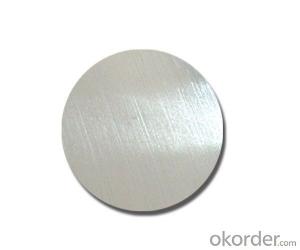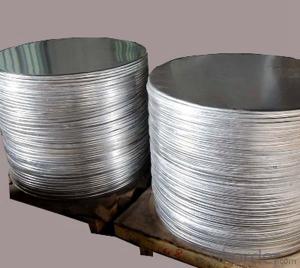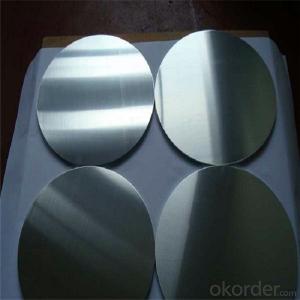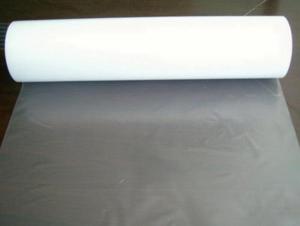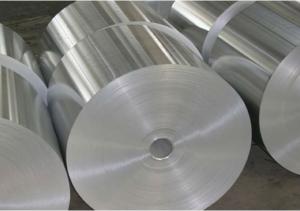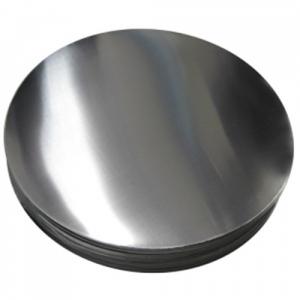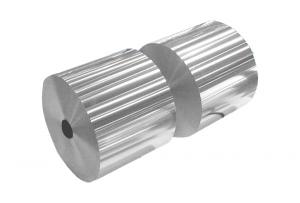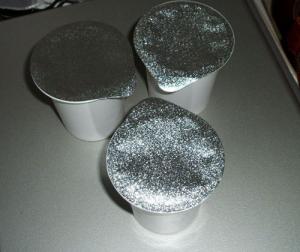Aluminum Pressure Cooker Fried Pan Circles
- Loading Port:
- Shanghai
- Payment Terms:
- TT OR LC
- Min Order Qty:
- 5 m.t.
- Supply Capability:
- 10000 m.t./month
OKorder Service Pledge
OKorder Financial Service
You Might Also Like
Specification
1.Structure of Aluminum Circle for Pressure Cooker Fried Pans Description
• Product: Aluminim Circle
• Application: It is used in cookware, engineering, lighting purpose, fried pans, non-sticky pans, cooking pots, kettles, hard anodize cook wire, pressure cooker and house hold utensils, reflector of the light, etc
• Advantage: Deep drawing and hard anodizing quality Aluminum Circle Sheet can be supplied. Our Aluminum Circle is RoHS and REACH compliance and uses well-protected packing. Our circles are excellent material for producing cookware, utensil, pots, pans and kettles.
2.Main Features of the Aluminum Circle for Pressure Cooker Fried Pans
• High manufacturing accuracy
• Smooth surface
• No waves
• High strength of extension and yield
• Well packaged
3.Aluminum Circle for Pressure Cooker Fried Pans Images
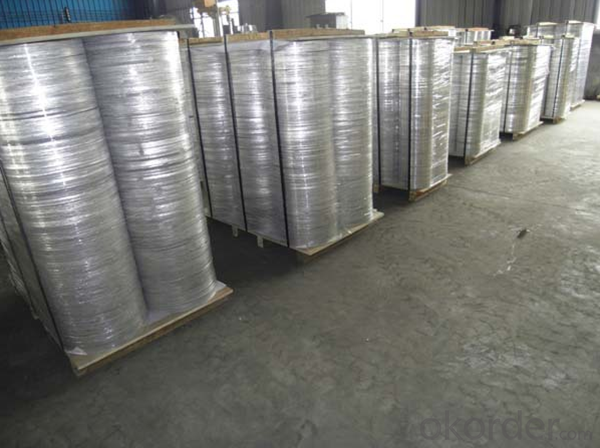
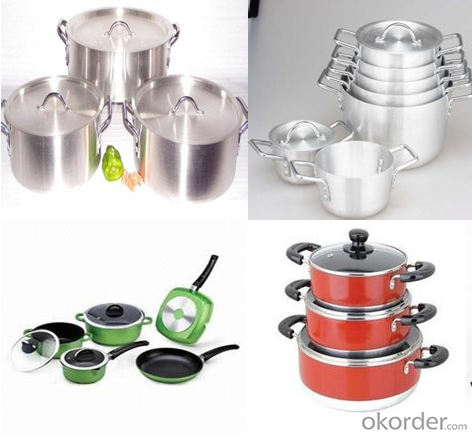
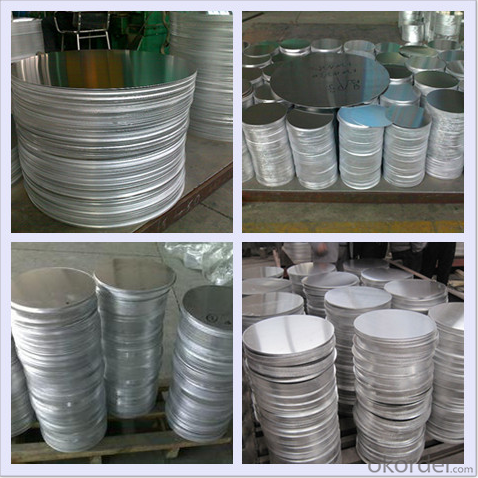
4.Aluminum Circle for Pressure Cooker Fried Pans Specification
Alloy | AA1050,AA1060,AA1100 AA3003etc. |
Temper | O,H14 |
Thickness | 0.5MM-4MM |
Diagonal | 100-1200MM |
Standard | GB/T 3880-2006 |
5.FAQ of Aluminum Circle for Pressure Cooker Fried Pans
We have organized several common questions for our clients,may help you sincerely:
① How about your company?
A world class manufacturer & supplier of aluminum coil and alloy blanks. Aluminum production base is comprised of 18 aluminum annealers, 10 coil and foil mills, 4 continuous production lines, 2 hot rolling production line and 3 prepainted lines.
Export 5000 tons per month to Asia, America and Middle East. Always do the best for our clients.
②Can you guarantee the quality of the products?
We are responsible for the quality of materials to get a long-term cooperation with clients in a reasonable period of time and we are glad to arrange and coordinate any third party inspection for you.
③What is the delivery time after purchase?
35 day after receiving client’s deposit or correct LC
- Q: Is it possible to utilize recycled aluminum for the production of cars or other types of vehicles?
- <p>Yes, recycled aluminum can be used to make cars and other vehicles. It is common practice in the automotive industry to use recycled aluminum in the manufacturing process due to its lightweight and strong properties. Recycled aluminum requires less energy to produce than new aluminum, making it more sustainable. It is used in various parts of vehicles, including engine components, body panels, and wheels. The use of recycled aluminum not only reduces waste but also contributes to energy savings and carbon emission reductions in vehicle production.</p>
- Q: This question asks about the chemical reaction between aluminum and water.
- <p>Aluminum does not react with water under normal conditions. However, when aluminum is heated, it can react with steam to form aluminum oxide and hydrogen gas. The reaction is exothermic and can be represented by the following equation: 2Al + 3H2O 鈫?Al2O3 + 3H2. This reaction is utilized in some industrial processes, but it is not a common occurrence in everyday settings. At room temperature, aluminum is protected by a thin layer of aluminum oxide that forms on its surface, which prevents further reaction with water.</p>
- Q: Explain the impact of adding magnesium to aluminum alloys on their characteristics.
- <p>Adding magnesium to aluminum alloys significantly enhances their strength, especially in the form of heat-treatable alloys known as Al-Mg or 5000 series alloys. Magnesium increases the alloy's resistance to corrosion, improves its formability, and raises its mechanical strength. These alloys are often used in applications requiring high strength-to-weight ratios, such as in the aerospace and automotive industries. The addition of magnesium also improves the alloy's weldability and resistance to stress corrosion cracking. However, it's important to note that excessive magnesium can lead to reduced ductility and increased susceptibility to stress corrosion cracking, so the amount added must be carefully controlled.</p>
- Q: This question asks for methods to protect aluminum from corrosion.
- <p>Aluminum corrosion can be prevented through several methods. One common approach is anodizing, which involves applying a protective oxide layer to the aluminum surface. This process enhances the metal's resistance to corrosion. Another method is using protective coatings such as paints or enamels that act as a barrier against corrosive elements. Cathodic protection, where aluminum is connected to a more easily corroded metal, can also be used. Additionally, ensuring proper design and avoiding contact with aggressive chemicals can minimize corrosion. Regular maintenance and inspection can help detect and address corrosion issues early.</p>
- Q: What other materials can be used for food packaging besides aluminum?
- <p>Alternative materials to aluminum for food packaging include biodegradable plastics such as PLA (Polylactic Acid), paper-based materials, glass, and stainless steel. Biodegradable plastics are derived from renewable resources and break down over time. Paper-based materials are sustainable and can be recycled. Glass is a non-porous material that is excellent for preserving food quality and is also recyclable. Stainless steel is durable, reusable, and does not react with food, making it a popular choice for reusable containers. Each material has its own set of advantages and disadvantages, and the choice depends on factors like food type, shelf life, and environmental impact.</p>
- Q: What limitations are there regarding the use of aluminum in food and beverage packaging?
- <p>Yes, there are restrictions on using aluminum in food and drink packaging. Aluminum can leach into food or beverages, potentially causing health issues. Regulations vary by country but generally aim to minimize exposure. For instance, the U.S. FDA has guidelines on the use of aluminum in food contact substances. In Europe, the European Food Safety Authority (EFSA) sets limits on aluminum migration into food. Manufacturers must comply with these regulations to ensure safety and avoid health risks associated with aluminum exposure.</p>
- Q: Is it possible to utilize aluminum in the manufacturing of medical devices like stents or implants?
- <p>Aluminum is not typically used in medical devices such as stents or implants due to its potential toxicity and lack of biocompatibility. Medical-grade materials like stainless steel, titanium, and various biocompatible polymers are preferred for their strength, durability, and ability to be safely integrated with human tissues. Aluminum can cause adverse reactions in the body, and its use in medical devices is generally avoided to prevent such complications.</p>
- Q: This question asks about the methods to guarantee that the aluminum content in products is within safe limits.
- <p>To ensure that products do not contain excessive amounts of aluminum, implement a strict quality control process. This includes sourcing raw materials from suppliers who adhere to strict aluminum content limits, conducting regular testing of products using advanced analytical techniques such as Inductively Coupled Plasma Mass Spectrometry (ICP-MS) or Atomic Absorption Spectroscopy (AAS). Establishing and following Good Manufacturing Practices (GMP) is crucial, along with continuous monitoring and improvement of production processes. Additionally, staying updated with regulatory guidelines and setting internal limits that are below the legal maximum levels can help maintain safety and compliance.</p>
- Q: This question asks about the impact of using aluminum tools and equipment in the workplace.
- <p>Using aluminum tools and equipment in the work environment can have several effects. Firstly, it can enhance safety due to aluminum's non-magnetic and non-conductive properties, which reduce the risk of electrical hazards. Secondly, aluminum is lightweight, which can decrease fatigue for workers and improve efficiency. Additionally, its corrosion resistance means longer tool life and less frequent replacement, which can save costs. However, aluminum's lower strength compared to some other metals might limit its use in high-stress applications. Overall, the choice to use aluminum depends on balancing these factors with the specific requirements of the work environment.</p>
- Q: Dangemen mills and other Aluminum Alloy and enterprises what is the difference?
- I looked at the statistics, found that Aluminum Alloy door enterprises Dangemen factory is the only one focused on the balcony. Other aluminium door enterprises cover many other products. This can be said to be the most obvious difference Dangemen factory and other enterprises.
Send your message to us
Aluminum Pressure Cooker Fried Pan Circles
- Loading Port:
- Shanghai
- Payment Terms:
- TT OR LC
- Min Order Qty:
- 5 m.t.
- Supply Capability:
- 10000 m.t./month
OKorder Service Pledge
OKorder Financial Service
Similar products
Hot products
Hot Searches
Related keywords
